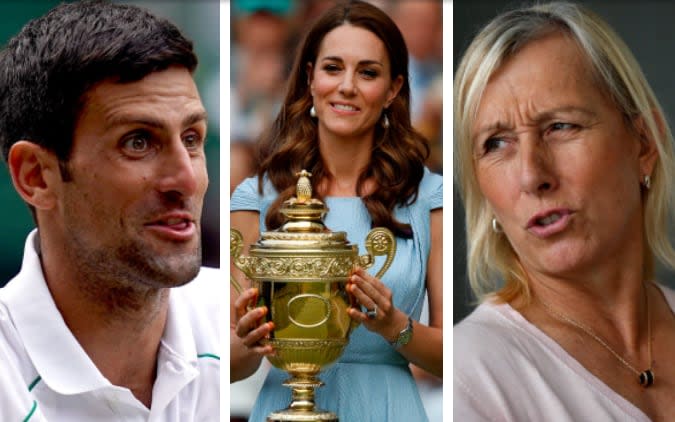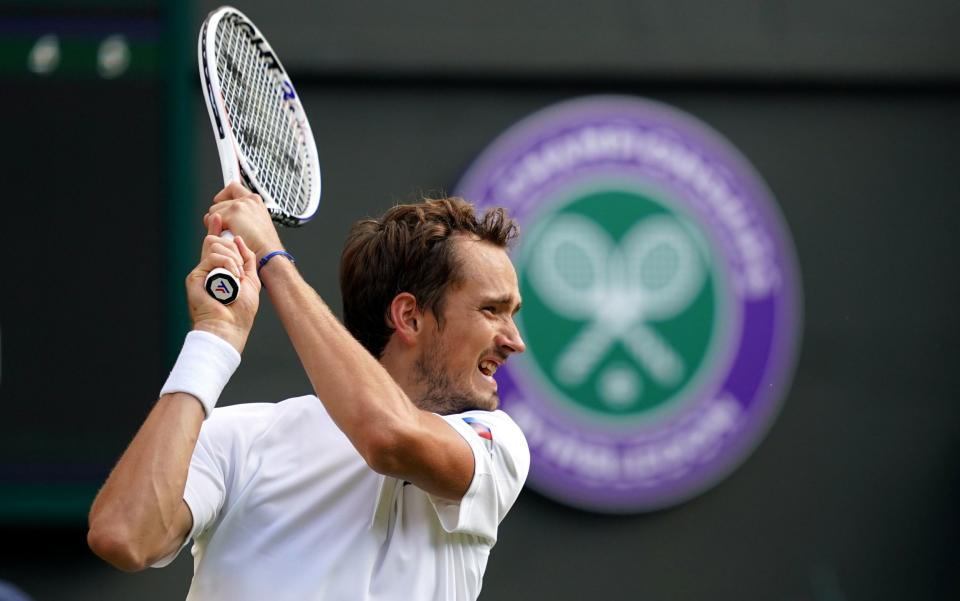Novak Djokovic and Martina Navratilova lead furious backlash at Wimbledon's ban of Russian players

Novak Djokovic and Martina Navratilova have denounced Wimbledon's decision to ban Russian and Belarusian players from this summer’s championships.
The All England Club issued a blanket ban due to the ongoing invasion of Ukraine and a possible public-relations disaster in the form of a trophy presentation to a Russian player on Centre Court by members of the Royal family.
Russia's Daniil Medvedev, the reigning US Open champion and current world No 2, would normally be among the tournament favourites, and last year the Duchess of Cambridge – who is the AELTC’s patron – watched Djokovic triumph on Centre Court from the Royal Box, then congratulated him as he received the trophy.
To compound the potential for embarrassment, this summer's showpiece is particularly high-profile given it celebrates the centenary of Wimbledon’s Centre Court.
Djokjovic released a statement tonight criticising the decision. "I will always be the first one to condemn the war. As a child of war, I know what kind of emotional trauma a war leaves us.
"Us in Serbia, we know what was happening here in 1999, ordinary people always suffer, we've had a lot of wars in the Balkans.
"That being said, I cannot support the Wimbledon decision. It's not the athletes' fault. When politics interfere with sports, it usually doesn't turn out well."
In an emotional interview, broadcast on LBC Radio, Navratilova - who renounced her Czech nationality in 1975 at the height of the Cold War to take US citizenship - said that she was “devastated” and “almost in tears” at the decision.
“Exclusion … is not the way to go,” Navratilova told Tonight with Andrew Marr. “And as much as I feel for the Ukrainian players and Ukrainian people… I think this is just going further than [the AELTC] needed to be going, quite frankly. I think it's the wrong decision. It's unfair to the whole world. There's so much bad going on. I think this is not helpful.
“Russian players and Belarusian players, some have even expressed their opposition to the war,” Navratilova added. “The only option now for them to play would be to leave their country. That’s something that I had to do in ’75, because of a totalitarian regime. And now we're asking them to do the same, because of politics, because of optics. I understand the banning of teams, of course, but on an individual level, I just think it's wrong.”
Asked whether she wanted organisers to perform an about-turn and let the likes of Medvedev and women’s world No 4 Aryna Sabalenka compete, Navratilova said: “I would like to say that. But I think it's too late for that. I think, you know, the horses have [left] the barn. It would be more difficult to reverse this.”

Three hours earlier, the AELTC had announced their decision to ban Russian and Belarusian players, which was first reported by Telegraph Sport a fortnight ago. In a statement, they suggested that it would be “unacceptable for the Russian regime to derive any benefits from the involvement of Russian or Belarusian players”.
The ATP and WTA Tours, as well as the International Tennis Federation, have so far only barred players from displaying their national flags or playing their national anthems, with Russian and Belarusian players currently permitted to play at next month’s French Open.
The Lawn Tennis Association has also backed the ban, meaning that it will extend to all professional senior or junior tournaments on British soil, including prominent events this summer like Eastbourne and the Queen’s Club Championships.
The decision has provoked outrage in Moscow, with British administrators accused of using sport to play political games. "Once again they simply turn athletes into hostages to political prejudice, political intrigues," said Kremlin spokesman Dmitry Peskov. "This is unacceptable. Taking into account that Russia is a very strong tennis country, our athletes are at the top of world rankings, the competition itself will suffer from their removal.”
The British Government has previously indicated that Russian and Belarusian players would need to denounce Vladimir Putin’s regime in order to compete at Wimbledon. But the AELTC ultimately decided that this was an unreasonable request to make, given the likelihood of reprisals against players’ families, and that it would be fairer and cleaner to take the decision themselves.
The Government expressed support for Wimbledon's decision, with sports minister Nigel Huddleston welcoming the "decisive action" and Culture Secretary Nadine Dorries adding: "This decision means Putin won't use the most iconic grand slam in tennis to try to legitimise the horrors he is inflicting on the Ukrainian people. The right move."
In the AELTC’s favour, they can fall back on their status as a private members’ club. This gives them more latitude to act unilaterally than any other organisation in tennis, while also giving them a better chance of defending their decision in a court of law.
The LTA, however, will be more exposed by their position as franchise-holders within the structure of the two main tours. The former Russian Davis Cup player Andrei Olhovskiy suggested on Wednesday that “it is necessary to file a class-action lawsuit” against any organisation attempting to exclude Russian and Belarusian players from competing.
Medvedev is not the only high-profile men's player who faces missing out this summer. The ban will also exclude Andrey Rublev, Karen Khachanov and Aslan Karatsev, who are among the world’s top 30 men. Rublev had written the words "no war please" on a television camera lens last month after winning a match in Dubai.
On the women’s side, the Belarusians Sabalenka and Victoria Azarenka, a gold medallist at London 2012, will be banned, as well as the Russian trio of Anastasia Pavlyuchenkova, Daria Kasatkina and Veronika Kudermetova. All are in the top 30 in the women’s rankings.
Responding to the news, three leading Ukrainian players – Elina Svitolina, Marta Kostyuk and Sergiy Stakhovsky - called for other tennis bodies to emulate the British stance. “We demand to exclude and ban Russian and Belarusian athletes from competing in any international event, as Wimbledon has already done,” the statement said.
"In times of crisis, silence means agreeing with what is happening. We noticed that some Russian and Belarusian players at some point vaguely mentioned the war, but never clearly stating that Russia and Belarus started it on the territory of Ukraine. The very silence of those who choose to remain that way right now is unbearable as it leads to the continuation of murder in our homeland."
But Shamil Tarpischev, the president of the Russian Tennis Federation, criticised the ban.
“Absolutely unfair decision regarding athletes,” said Tarpischev. “Since when does the country disqualify athletes and for what? What are Russian and Belarusian athletes to blame for? The decision was made without the opinion of international sports organisations, organisations that specialise in tennis. Who are they, making this decision? It turns out that the country [Great Britain] ‘runs over’ our athletes. Why on earth, it’s not clear to me.”
New powerbrokers go from background to making biggest call in the sport
By Simon Briggs
Whatever you think of the All England Club’s decision to ban Russian and Belarusian players from this year’s Wimbledon, it’s hard not to conclude that there has been a failure of diplomacy.
The strong moral stance taken by the AELTC Committee has encountered shock and anger on the part of tennis’s other stakeholders, in a manner that underlines the lack of connectedness within this bizarre sport.
Above all, we are looking at an inexperienced leadership group within the AELTC, who appear to be making their decisions in a vacuum. The same goes for the Lawn Tennis Association, only more so, because the LTA lack the AELTC’s ability to say “We’re a private members’ club, and we can do what we want.”
To understand the way the AELTC works – or, sometimes, doesn’t – you need to consider the recent departures of two long-serving leaders in chairman Phil Brook and chief executive Richard Lewis.
When Lewis left in 2020, he was replaced by Sally Bolton, who had previously worked with him within the sport of rugby league. At 47, Bolton is relatively young to be in this post – at least by comparison with her predecessors. While she is described as a fluent and convincing presence in meetings, she does not have the deepest of tennis backgrounds.
Then there is the new chairman, Ian Hewitt, a partner at the well-known City law firm of Freshfields Bruckhaus Deringer. Hewitt took over from Brook in 2019 and is now 74, which means that he is banging up against the typical top limit of 75 for AELTC chairmen.
Again, Hewitt has not invested himself in the arena of tennis politics in the same manner as Brook, who was known for flying all over the world with his wife Gill and sitting in a prominent position in the stands. Brook made plenty of enemies during his nine-year tenure but he was always connected, always involved.
It would be hard to imagine Brook and Lewis finding themselves as friendless as the AELTC seemed yesterday, when their only allies on the world stage were located within the British government. The international tennis community seems to have turned against them, unless the French Tennis Federation should suddenly perform a U-turn and exclude Russian/Belarusian players from next month’s French Open.
A similar issue prevails at the LTA. Although Scott Lloyd has been in charge there since 2018, his concerns have been largely domestic. There are only two Britons who are well connected within the international game, and neither works in this country. Chris Kermode, the former ATP chief executive, now helps to run the Monte Carlo Masters, while Stephen Farrow – who used to be the tournament director at Queen’s – is at Tennis Australia.
Wimbledon are clearly in a better position to dodge any potential backlash than the LTA, thanks to their independent status. But they should also be concerned about echoes of 1973.
That was the year when Niki Pilic was unable to enter Wimbledon, because he had refused to represent his native Yugoslavia in a Davis Cup match, and the sport’s various authorities lined up against him. The result was that the players organised their own boycott of Wimbledon, with only three members of the embryonic ATP turning out, and the other mens’ places being filled by lesser lights.
That dramatic moment – the only previous example of a leading player being excluded from Wimbledon – led to the birth of tennis rankings and the triumph of player power. Tennis would surely enter some kind of crisis were there to be a reprise of the Pilic situation this summer, however unlikely that might seem.
Ultimately, though, Wimbledon’s massive wad of prizemoney should persuade most waverers to pack their rackets and fly in to London in June. The total pay-packet stood at just over £35m in 2021, and this year’s figure is due to be announced on Tuesday, during the AELTC’s annual spring press conference.
That same spring press conference will no doubt witness some robust debate as Hewitt and Bolton try to defend their brave but evidently unpopular stance on Russia. Traditionally, the AELTC hold a dress rehearsal in which their PR team shoot questions at the leadership in order to prepare them for the grilling they are about to receive. But feelings are running particularly high this year, and these two newcomers will find themselves under an unusually hot spotlight.

